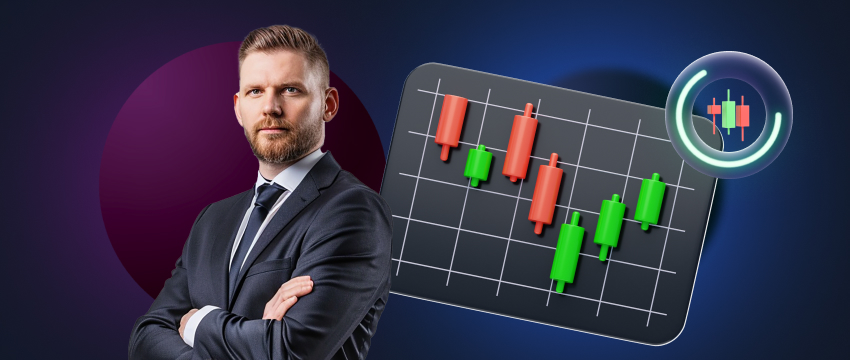Scalping is an immensely popular day trading strategy, often employed by the scalper, a trader who thrives in high-intensity environments, and it is favored by many forex traders looking for quick, small profits.
It’s a tactic that relies on making many rapid small trades with quick entries and exits while only looking for incremental profits. In other words, the forex scalping tactic relies on quantity rather than quality.
So the quick answer to the question in the title is that a scalper in forex is someone who trades currency pairs using scalping strategies. However, that won’t suffice. In this article, the ins and outs of forex scalping will be presented.

What is scalping?
As mentioned, scalping is a fast-paced incremental gain strategy in trading. More precisely, scalpers aim to have very detailed control over their trades, often having a specific pip where they want to enter and exit.
Scalpers can make tens or even hundreds of trades per day, but their gain per single trade is very small. As such, traders employing the scalping tactic aim for quantity and consistency.
What does a scalper need?
To even have hopes of becoming a successful scalper, traders need to find an environment to match their trading regimen. Scalping, due to its precise nature, is highly dependent on device, network, and service provider capabilities.
To start off, scalpers need a broker that doesn’t prohibit scalping. Many online forex brokers either prohibit it through their terms or set a time limit between entries and exits.
This is the only condition here that’s absolutely necessary, but the importance of the ones below shouldn’t be discounted, as not meeting them can make scalping harder and much less profitable.
Next, scalpers will need a strong trading device. Because of the precise inputs, it’s important to eliminate any sort of lag or delay. Ideally, scalping traders will want a device that allows their platform to run smoothly, without any hiccups.
Additionally, it’s important for the broker to have low latency as well. The same logic tracks; since these traders want to target specific pips, it’s important for them to make trades precisely when they want.
Of course, a CFD broker’s low latency won’t do scalpers any good if their own connection isn’t strong. Preferably, they trade on a device with a wired connection to their router. This eliminates any lag or disconnections that may occur on Wi-Fi networks.

Trading quality requirements for a scalper
Getting into the trading part, a broker’s fee structure is also vital for scalpers. For instance, some brokers employ a fee-based pricing scheme, where there’s a flat charge for each trade.
This would erase any profits a scalper would generate, so it doesn’t work. Scalpers look for spread-based pricing structures, with the spreads being as tight as possible.
Similarly, high liquidity assets are generally what scalpers aim for. Getting out of trades at the right time is crucial for scalping, and high liquidity allows that.
Lastly, scalpers generally prefer low volatility, since the small price movement they rely on happens constantly. In times of low volatility, the movements are more controlled and may be easier to predict.
Why do scalpers trade forex?
The last three conditions we mentioned may have rung a bell. They are all qualities present in forex markets. The answer is simple, scalpers flock to forex because it matches their preferred trading conditions.
Of course, this is primarily true for majors and minors, and less so for exotics. Prominent pairs can be traded 24/5, have a massive trading volume, and are highly liquid. In particular, scalpers tend to be most active during the peak times for their preferred pair, since that’s when these qualities are most noticeable.
There’s no inherent connection between forex and scalping. It’s just that they supplement each other well, and traders have taken note of that.
Scalping pros and cons
Scalping, like all trading strategies, has its strengths and weaknesses. Traders shouldn’t look to find the best trading strategy, but rather one that suits them. This short list of pros and cons may help form a clearer picture
Pros:
- Immediate feedback: Unlike with most trading strategies, the feedback from scalping is instant. Since trades last a short time, scalpers will know whether they’ve succeeded or failed right away. Additionally, since they don’t tend to leave positions open overnight, they can always tally up their results at the end of a day to estimate their performance.
- Technical based: The vast majority of trading data scalpers base their routine upon is technical. This may make scalping more personally suitable for traders who don’t enjoy deep asset research or simply prefer technical analysis.
- Less knowledge burden: Since scalpers rely on current market states, scalping requires a lot less research. This makes it easier to get into than other types of trading.
- Constant trading opportunities: Scalpers don’t depend on specific market states as long as there’s price movement. As such, they can find success even if entire markets go bearish, while other traders may struggle.
- Reduced risk exposure: In scalping, trades end within a few minutes after they start. As such, there’s no chance of waking up and seeing your portfolio turn red.
Cons:
- Draining: Scalping is an extremely tiring trading style that requires constant active attention.
- Burnout: Building on the previous point, many scalpers experience burnout quickly. It’s important for scalpers to find a routine where they don’t do too much.
- FOMO: Finding a routine that doesn’t do too much, however, may lead to fear of missing out. As such, it’s vital for traders who opt for scalping to have a strong mentality.
- Specific: As noted, scalping only works well in specific conditions. Finding these conditions may be difficult, and may only work on a few assets, which in turn makes organising a solid trading portfolio harder.
- Difficulty applying knowledge elsewhere: Since scalping is a particular strategy, the things traders learn there may not apply to other trading strategies. It may prove difficult to get out of bad habits and transition to other styles.
How can a scalper make it easier?
It’s clear that scalping is a very demanding trading strategy. It requires quick reflexes, precise execution both in terms of market navigation and device commands, and a clear head with a strong mentality. However, there are ways to alleviate some of that burden.
- Hotkeys: Fewer clicks and faster reactions; requires a hotkey-friendly platform like MT4
- Multi-screen setup: Makes it easier to organise your virtual trading interface and track assets.
- Specialised gear: A gaming mouse or macro keyboard allow scalpers to bind platform functions to button presses.
- Alerts and visual cues: Lessen the burden of tracking asset prices.
At the end of the day, these won’t make or break scalping. However, for traders who find it just a bit too difficult, these measures may help them bridge that gap.

Conclusion
Scalping in forex is an effective yet demanding strategy. Scalpers may find themselves looking for the perfect conditions for quite a while until they find a trading hub.
However, that doesn’t mean it should be discounted. It’s quite a unique strategy that rewards quick thinking and discipline, creating a trading experience that isn’t really similar to any other tactic.
Traders who are interested in scalping won’t know whether it’s for them until they try it out. Those interested can do so on a long-lasting demo account without the risk of financial loss.
Clause de non-responsabilité : Ces informations ne sont pas considérées comme des conseils ou des recommandations d'investissement, mais plutôt comme une communication marketing.




